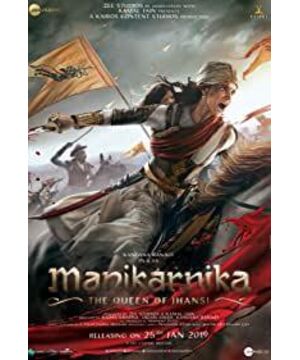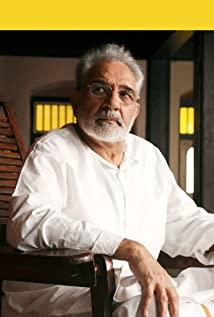In 2019, India released a historical biographical film "Queen of Zhangxi", which was based on the story of Queen Zhangsi of India who fought against the British in 1857.
In the vigorous Indian national uprising, a small town in central India emerged in Zhangsi, a national hero who vowed to die against the British - Queen Lakshmi Baiyi (Rani of Jhansi, November 19, 1835 - 1858) June 18, 2008), named Lakshmi Payi , also translated as Queen Jhansi .
Lakshmi Bai was born in Benares, India. When she was three or four years old, she followed her parents to live in the palace of Prime Minister Baji Rao II in Maratha, and lived with the adopted son of Prime Minister Rao II. Nana Sahib and Tantia Topi became good friends. She learned martial arts since she was a child, and learned riding and shooting at the age of 7. She is very smart and brave. In 1852, the seventeen-year-old Baiyi married Gangadar Rao, the prince of Zhangxi, who was much older than her, and became Queen of Zhangxi. At that time, she was already a woman proficient in martial arts.
At that time, India was a colony of the British Empire. After the British occupied India, the colonists looted the people's fat and plundered the property of the peasants, and even intervened in the internal affairs of the state, forcing the princes and nobles of India to pay high alliance fees (protection fees). In the face of the powerful and domineering British, even the king has to give them some face, but Queen Zhangxi is not willing to bow to the powerful British colonizers, let alone see her people being bullied by them.
The shameless plundering of the British led to the decline of the Indian economy, and famines continued to occur. In the great famine of 1770, 1/3 of the population of Bengal was taken away. It is against this background that India happened in 1857. A major event, the Indian National Uprising (also known as India's First National War of Independence, 1857 War of Independence) broke out.
The prince later died, and he had no son. According to the regulations of the British colonial authorities, after the death of a prince of various Indian states, if no son inherits the throne, then his territory and property will be reclaimed by the colonial authorities. Baie adopted a son and ascended the throne as guardian of the adopted son. However, the British colonial authorities still dispatched troops and forcibly confiscated all of Zhangxi's territory and property. Bai Yi was kicked out of Zhangxi City.
In front of the British officials, Bai Yi, who had a strong personality, said angrily: "I will never give up my Zhangxi, whoever dares to occupy Zhangxi, let him try it!"
In the face of the unreasonable actions of the British, the people of Zhangxi also fully supported Payi's request, and expressed their willingness to work with the Queen to fight resolutely against the British colonists. In May 1857, the Indian National Uprising broke out. The fire of the uprising burned all over the country, and soon a prairie prairie trend was formed. The whole country actively participated in it, and formed a large city such as Delhi, Lucknow, and Zhangxi. The center of the uprising stronghold.
The Zhangxi people, led by Bai Yi, also launched an attack on the colonists. On June 4, she commanded the insurgent army to occupy the arsenal, killed Dunlop, the highest commander of the British army in Zhangxi, and finally recovered Zhangxi, and the British surrendered. On July 8, Zhangxi City was filled with festive joy. Bai Yi regained the throne amid the cheers of the crowd. The rebel army solemnly declared: "The world belongs to God, India belongs to the Mughal emperor of Delhi, and Zhangsi belongs to Lakshmi Bai Yi!"
After the Queen came back to power, in order to cooperate with the anti-British struggles in various parts of India, Payi led the army to go south and north to fight, hitting the British colonial rulers hard. However, in September of this year, Delhi was captured by the British army; when the British army had a chance to breathe, they transferred their troops to Zhangxi. . Lucknow also fell in March. The British army freed up their forces and rushed towards Zhangxi viciously. Queen Zhangxi received information, stored food in the city in advance, built fortifications on the city wall, set up cannons, and prepared to meet the invading army.
In March 1858, after Ross arrived in Zhangxi, he first sent troops to surround the city of Zhangxi, and then built forts in the south and southeast of the city, ready to attack the city. Queen Payi saw the opportunity and gave an order: "Open the cannon!" In an instant, the sound of the cannon rumbled, the smoke filled with gunpowder, and shells of hatred were fired at the British positions. The British also hurriedly fired back fire. Although the British cannons were more powerful than the Queen's cannons, the insurgents were all brave and good at fighting.
After that, the British army stormed the South Gate, trying to concentrate firepower to open the South Gate. Seeing this, the queen hurriedly turned the guns and aimed them at the British fort, only to hear a few loud bangs, and a British fort disappeared. The insurgents temporarily suppressed the British firepower.
Due to the betrayal of the traitors, on April 4, the British army concentrated artillery fire on the weakly defended South Gate, and finally blew a gap in the South Gate. Facing the British army that rushed into the city like the tide, the queen waved a steel knife and rushed up with a thousand soldiers in person, and launched a hand-to-hand battle with the enemy. The two sides were inextricably killed, and the north gate also fell. The rebels were outnumbered and had to withdraw from Zhangxi.
After the rebel army led by Queen Baiyi withdrew from Changxi, she joined a team led by another rebel leader Toby in Gwalior, another important town in central India, on June 1. At this time, the Mughal dynasty had completely perished, and the anti-British uprising in all India had no leaders. Baiyi and Toby elected another uprising leader Sahib as the leader, Toby was the commander-in-chief of the insurgent army, and Baiyi was responsible for guarding Gwalior City. Queen Payi made an oath: "I will go all out to defeat the British army!"
On June 17, the British troops encircling Gwalior began to siege the city. The majestic Gwaliaor defense battle has begun! Queen Zhangxi was wearing a battle uniform, holding a steel knife, riding on a white warhorse, personally commanding the battle, and galloping across the battlefield. Where is the most dangerous, her brave and vigorous figure appears. Seeing that the Queen was so brave, the rebels had increased confidence and high morale, and repeatedly repelled the British attack again and again.
On June 18, the British army decided to launch a general attack, and a fierce battle came. On this day, as before, the Queen led an army to attack the siege British army. She herself dressed in men's clothing and fought heroically against the artillery fire of the British army many times. Then quickly returned to the horse city. Seeing that the east gate guarded by the queen was not easy to conquer, the British army sent troops to attack the other defenders until finally, they surrounded the queen. Three gunshots "Boom! Boom! Boom!" The continuous shelling of the British army blew a large hole in the city wall, and groups of British troops rushed in.
"Come with me and attack the enemy's artillery positions!" At the critical moment, the queen swung her sword and raised her arms and shouted. The cavalry of the insurgent army rushed over like lightning, and the British artillerymen hurriedly dropped their cannons and went to get their rifles. It was too late, but it was fast, the queen's steel blade flashed, and the skull of a British soldier rolled to the ground. Most of the British artillery became the ghost of the rebel cavalry. Just when Bai Yi killed the enemy artillery and regrouped the team, the British army surrounded them from all directions. The queen raised her sword decisively: "Rush out, hurry up!"
The insurgents struggled to break through the siege. Suddenly, a British army officer recognized Bai Yi on the white horse and shouted frantically: "She is Queen Zhangxi, hurry up, catch her alive!"
The British army around the queen became more and more surrounded, but she was not afraid, she cut left and right, and was unstoppable. Suddenly, she felt that her head was hit hard by something, and blood flowed all over her face. It turned out that a British cavalryman slashed from the queen's side with a knife, cutting off the queen's right eye.
Bai Yi endured the severe pain, turned his body, jumped on his horse, and charged towards the British cavalry. Suddenly, another British soldier came to the Queen and stabbed her in the chest with a bayonet. The queen shook her whole body and the pain was unbearable, but she gritted her teeth and used all her strength to hack the enemy to death.
Bai Yi fell off the horse, and the close-fitting female soldier quickly carried her into a hut by the roadside. When the master saw that it was their beloved Queen Zhangxi, he immediately rescued her regardless of her life. However, the queen stopped breathing because of the bleeding and her injuries. Queen Zhangxi was only twenty-two years old when she died, and the Indian national uprising that shocked the world also failed. Historians say that although the uprising did not completely overthrow the British colonial rule, it also dealt a heavy blow to the British colonists. The United Kingdom spent countless wealth and countless British officers and soldiers died in the war, breaking the invincible British colonists. myth.
The young Queen Zhangxi died for her country, but her name will remain in the annals of history for posterity. She is also known as the Joan of Arc in India. Even her enemies admired the terrified and terrified young girl, whose ashes were buried with the highest military salute after the Queen's death. General Ross, the commander-in-chief of the British army, said in his memoirs: "Queen Zhangxi's outstanding beauty, intelligence and tenacity made her the most dangerous figure to us of all rebel leaders ("remarkable for her beauty, cleverness and perseverance" had been "the most dangerous of all the rebel leaders")".
Until modern times, there is the tomb of Lakshmi Bhai in Gwalior , and bronze statues of the queen riding a horse and wielding a knife in Zhangsi and Gwalior. The University of New Delhi has the famous Lakshmi Pai Women's College, the Indian Army has the Lakshmi Pai Women's Corps, and there are many streets, girls' schools, and social organizations named after her throughout India. Her glorious deeds were compiled into poems and spread throughout India shortly after her sacrifice, and later, a large number of novels, plays and other literary works appeared. Among them, the novel "Queen of Zhangxi" was translated into Chinese and published by Shanghai Children's Publishing House in 1981. India made two films based on her exploits in 1953 and 2007. Among them, the 1953 film "Queen of Zhangxi" was compiled into Chinese and screened in various parts of my country, with great response. The deeds of Queen Zhangxi have also been included in the world history textbooks for middle schools in my country.
Queen Payi used her youthful life to compose a heroic chapter of resisting aggression and pursuing freedom. She is a well-deserved pride of the Indian people and admired by people all over the world.
View more about Manikarnika: The Queen of Jhansi reviews











